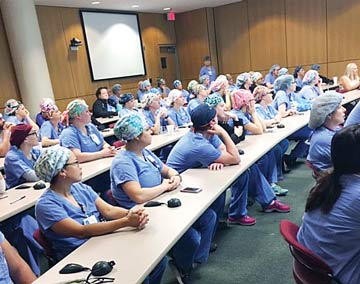It's not that difficult to learn from your mistakes. All it takes is gathering your nurses and surgical techs for a half-hour meeting every few months to talk about errors that occurred and what can be done to make sure they don't happen again.
Surgeons do it all the time. They meet to comb over the details of a surgical error, discuss what could have gone differently, and update policies and procedures to ensure they don't repeat the same mistake. The forums, called morbidity and mortality meetings, have been extremely successful in improving the practice of experienced physicians and the training of med students and surgical residents.
When several of our nurses who were involved in an adverse event participated in a surgeon-led morbidity and mortality meeting, I thought: Why shouldn't other members of the surgical team benefit from the same frank conversations about ways to improve patient safety?
We now gather members of the surgical team to discuss incidents that occurred, including near misses or complications that can be avoided. The meetings are held once a quarter, lasting no more than 30 minutes (see "Stick to a Specific Patient Safety Agenda"). Each conference involves a 15-minute presentation by staff members followed by a question and answer session. Our department has realized several benefits since we started holding the meetings:
- It's constructive to have members of the surgical team gather with their peers to have honest discussions about errors and near-misses in order to define exactly what happened.
- The meetings are relevant learning opportunities for staff based on real-life events their colleagues experienced or safety-related issues the entire team needs to solve.
- Staff appreciate the opportunity to openly share how they can improve their practices, are more aware of incidents that occur and learn how they can prevent them.
Managers can conduct retrospective reviews of safety incidents, but they don't have an intimate knowledge of the root causes or what team members involved were thinking. Plus, staff would rather hear from peers than managers. It's a powerful message when colleagues can share what happened, admit the mistakes made and lead an open and honest discussion about how the team can ensure something similar won't happen again. That's a far better approach than having a manager stand in front of the group to reprimand them for their performance.
Interestingly, staff told us they want to hear from surgeons involved in events. We've invited several surgeons to join us, but they've declined for numerous reasons, including their busy schedules. Staff also shared in the meetings that they wanted to hear from management about policies and procedures relevant to the adverse events discussed. They often knew what needed to be done to prevent patient harm, but didn't always understand the reasoning behind the correct actions to take.
.svg?sfvrsn=be606e78_3)

.svg?sfvrsn=56b2f850_5)